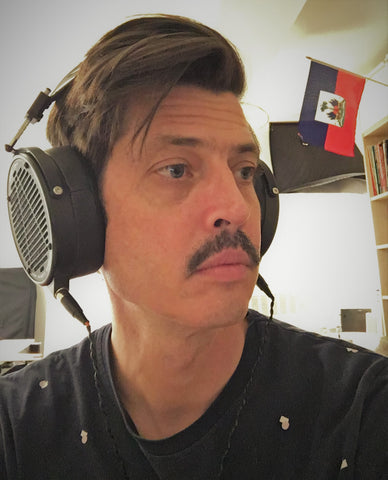
Percussionist, drummer, and composer Ches Smith is a forward-thinking, genre-bending musician with a bent toward experimental and avant-garde improvisation. Getting his start as a touring musician with Mr. Bungle in the mid-'90s, Smith has established himself as a highly regarded collaborator with artists like Xiu Xiu, John Zorn, Mary Halvorson, and others. He has also issued several inventive albums of his own, and works regularly in Marc Ribot's Ceramic Dog trio.

Here's our chat with Ches:
Can you pick out any favorites from your work that you're particularly proud of?
I like The Bell by Ches Smith/Craig Taborn/Matt Maneri (ECM) a great deal because of the feeling that was generated among that trio by all the live work we did over the subsequent years since its 2016 release. Craig and Mat dig in 100% every time we play, and the music grows accordingly.
I am also proud of the new as-yet unreleased record by my group We All Break, because it brought together disparate musics, cultures, and learning styles, and everyone felt like it was really worth doing. That's all I can ask for when I lead a project. (This new project and the previous We All Break effort were recorded and mixed by Audeze's good friend Ron St Germain.)
What's the best place for those new to your work to become familiar with what you do?
Although surely not the most well known, my solo drum/electronics/vibes project "Congs for Brums" represents the greatest unmitigated proportion of my musical decision-making:
How would you define your main role on most of the projects you work on?
My role changes from project to project. As a drummer, I guess on a macro level it's that of balance--sometimes I'm needed to provide energy and push against what's happening; other times I need to support what's going on.
How did you get started in your area of the business?
My older brother got me into the drums at a young age, and I've been at it ever since, basically. Once I started playing gigs, one thing led to another.
Can you briefly describe a moment of frustration from your past work, and what you may have done to overcome the obstacles? Would you approach it differently now?
Early on as a composer, when I realized I wasn’t expressing what I wanted to express—and that things needed work better in my compositions. I eventually solved it by spending a lot more time on writing music. It definitely got me to a different place.
As a drummer, I remember a hang up very well, when I got fired from a recording session right when I moved to New York. I was like, "well, that's a great way to arrive to town." After the dust settled I realized I wasn’t the right drummer to be on that session at all. Then I stopped trying to be everything for everyone, and focus on the relationships that really mattered, the unique ones that have an energy.
Is there any gear you find yourself turning to most when working on a project?
Not overly so, just my old standby stuff—a few drumsets, my vibraphone, Haitian drums. I tend to like to check out backline gear as well. You never know...
Do you have any words of wisdom for people who might aspire to get where you are in their own careers?
Probably just to work hard, don’t expect a lot in return. It's nice when things come back to you, but it's unpredictable ... I find if I can enjoy the work itself then I'm already rewarded.
I recently watched a Cecil Taylor interview where he's like "when you're out there making art, and accepting the final responsibility of knowing that your livelihood depends on it, then you go forward into it, but you want to also come to understand that, nobody really asked you do this." That sums it up.
How long have you been working with headphones, and what inspired you to start including them in your workflow?
I've been working with headphones tracking on recordings as long as I've been recording, which is about 30 years. During mixing, only occasionally, if they were already available. And that would be to get a different perspective from the studio monitors which I previously had considered the "standard" sound of the mix we're working on.
Recently with this quarantine I realized I would need to "attend" a mix remotely, in real time, and I needed another option as good as studio monitors. I remembered the producer of the session, David Breskin, loaning me his Audeze cans to track with, and how amazingly I could hear. This mix was very important, I needed my listening to be on a forensic level. So I thought I'd find out how to get a pair. They helped immensely. I'd say half my listening during the week-long mix was on my studio monitors, half was on headphones.
On (that) recent mix, I relied on my Audeze LCD-Xs when I needed to get “forensic.” They became the truth-tellers when I needed to make a critical decision as to levels, amount of EQ, reverb etc. I quickly realized they told me exactly what was going on, in a very pleasurable, immersive way.